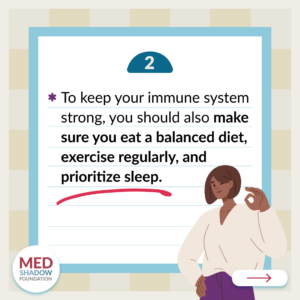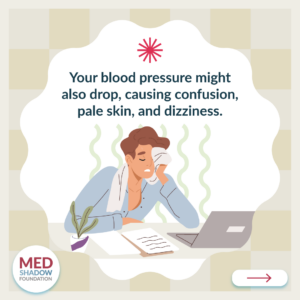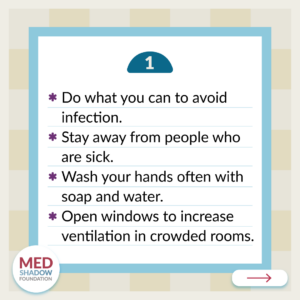More than ten years ago, South African actor and model Chalrbi Dean survived a serious car accident. The accident damaged her spleen and doctors had to remove it. Unfortunately, that left her more susceptible to dangerous infections, including the one that led to bacterial sepsis that killed her in 2022. She was 32 years old. Would she have survived if she’d still had her spleen? We can never know. Here’s what to know about your spleen, the conditions that can damage it, and what happens if you have it removed.
What Is the Spleen?
The spleen is an organ located behind your left rib cage, next to your stomach. Its size varies from person to person but is just over four inches long for most of us. Your spleen is about 25% “white pulp” which contains immune cells and 75% “red pulp” which is mostly made up of red blood cells. Throughout your life, more and more of your spleen becomes white pulp. Smooth muscle and connective tissue surround the pulp. The organ is filled with vessels that shuttle immune and blood cells in and out.
What Does the Spleen Do?
 The spleen has two main jobs. The first is allowing a variety of types of immune cells such as B cells, T cells, and plasma cells to mature so they can travel to your lymph nodes and circulate throughout your body to fight infectious agents such as viruses and bacteria.
The spleen has two main jobs. The first is allowing a variety of types of immune cells such as B cells, T cells, and plasma cells to mature so they can travel to your lymph nodes and circulate throughout your body to fight infectious agents such as viruses and bacteria.
The second is filtering your blood. Blood flows through many small capillaries in the red pulp of your spleen, which filter out bacteria, microorganisms, infected blood cells, broken pieces of red blood cells, and old and ineffective red blood cells.
It also stores extra iron and blood, and in the event of severe sudden anemia, may release it into the rest of your body.
How Do You Keep Your Spleen Healthy?
There’s only so much you can do to protect your spleen if you have certain conditions. The best way to keep your spleen healthy is to practice all the healthy habits you already know: eat a balanced diet, get regular exercise, manage stress, and sleep well. Wash your hands to prevent infections. Because liver damage can lead to spleen problems, it’s important to protect your liver by limiting your alcohol use. 
To learn more, read MedShadow’s articles:
New Alcohol Use Disorder Drugs Gaining Respect
Ditch the Drink: Instagrams Best Booze-Free Ways to End the Workday
Not Feeling Merry? Manage Pain, Mental Health During the Holidays with a Mind-Body Approach
Signs of Spleen Problems
 In addition to other symptoms of the condition causing your enlarged spleen, the enlarged spleen itself may push against your stomach and cause you to feel:
In addition to other symptoms of the condition causing your enlarged spleen, the enlarged spleen itself may push against your stomach and cause you to feel:
- Full after eating smaller amounts of food
- Pain in the upper left abdomen
- Fatigue and weakness due to anemia
What Is a Spleen Rupture?
In rare instances, your spleen can burst open and cause serious internal bleeding. Usually, this happens to people who have sustained traumatic injuries such as car accidents, however, if your spleen is already enlarged due to other conditions, you’re at higher risk. About 0.1 to 0.5% of people infected with mononucleosis experience ruptured spleens.
Much smaller traumas such as falls, contact sports, or heavy lifting might trigger a rupture in those with enlarged spleens—that’s why doctors usually recommend that you avoid sports and heavy lifting during and shortly after treatment— but it can even happen spontaneously on rare occasions.
Signs Your Spleen Is Injured or Ruptured
 The clearest symptom of your spleen rupturing is intense pain behind your left ribs that can also radiate up to your left shoulder. Your blood pressure might also drop, causing confusion, pale skin, and dizziness. If you think your spleen may be ruptured, you should go to the emergency room immediately.
The clearest symptom of your spleen rupturing is intense pain behind your left ribs that can also radiate up to your left shoulder. Your blood pressure might also drop, causing confusion, pale skin, and dizziness. If you think your spleen may be ruptured, you should go to the emergency room immediately.
Causes of Spleen Problems
There are a variety of conditions that can cause spleen problems including:
- Liver disease
- Vascular obstructions such as thrombosis that cause reduced blood flow to the organ
- Blood cancers such as leukemias and lymphomas.
- Autoimmune diseases that attack red blood cells
- Infiltrative disorders that affect multiple systems in your body such as sarcoidosis or lupus
- Infections such as Epstein-Barr virus (mononucleosis), HIV/AIDs, Malaria and more.
- Tumors or cysts
The most common causes of an enlarged spleen are liver disease, blood cancers, and infections.
Drugs that Can Enlarge Your Spleen
One small study in patients with colorectal cancer that had metastasized to the liver suggested that those who were treated with a specific type of chemotherapy, oxaliplatin, were more likely to have an enlarged spleen than those treated with other types. And anyone who did have an enlarged spleen after chemotherapy, but before surgery, had more signs of liver damage.
Another small study found that over 70% of people who were treated for colon cancer using the same drug (oxaliplatin) developed an enlarged spleen. However, about three-quarters of those patients recovered within 1.5 years of stopping the treatment.
It’s not clear whether many other drugs directly harm your spleen, however many medications are known to cause liver damage, which can, in turn, lead to an enlarged spleen.
How Do You Treat an Enlarged Spleen?
 There aren’t specific treatments designed to treat an enlarged spleen. Instead, experts say, your healthcare provider will need to determine what’s causing the enlargement, and treat that condition. Treatments for these underlying conditions can include chemotherapy to treat cancer, immunosuppressants to treat autoimmune conditions, or antibiotics for bacterial infections. During chemotherapy or immunosuppression, infections that would typically be mild could become life threatening. Always ask your healthcare provider which side effects should be reported immediately, since some can signal dangerous complications. In rare cases, your physician may recommend a splenectomy, or removal of your spleen.
There aren’t specific treatments designed to treat an enlarged spleen. Instead, experts say, your healthcare provider will need to determine what’s causing the enlargement, and treat that condition. Treatments for these underlying conditions can include chemotherapy to treat cancer, immunosuppressants to treat autoimmune conditions, or antibiotics for bacterial infections. During chemotherapy or immunosuppression, infections that would typically be mild could become life threatening. Always ask your healthcare provider which side effects should be reported immediately, since some can signal dangerous complications. In rare cases, your physician may recommend a splenectomy, or removal of your spleen.
Side Effects of Cancer Treatments
There are several types of cancer treatments such as chemotherapy and immunotherapy.
Chemotherapy
Some of the most common side effects of chemotherapy include:
- Brain fog
- Diarrhea
- Fatigue
- Infections
- Nausea/vomiting
- Neuropathy
- Hair loss
Read more in MedShadow’s How to Cope with Chemo Side Effects.
Immunotherapy
Some of the most common side effects of immunotherapy include:
- Diarrhea
- Itchy skin
- Constipation
- Anemia
- Low white blood cell counts
- Low blood pressure
- Tremors
- Fever
- Aches and pains
Read more in MedShadow’s Immunotherapy Side Effects: Beyond the Immune System.
Side Effects of Immunosuppressants
Doctors frequently use corticosteroids to dampen inflammation related to a variety of autoimmune conditions.
Common side effects of corticosteroids include:
- Weight gain
- Reflux
- Swelling
- Mood changes
To learn more about corticosteroids and other immunosuppressants read MedShadow’s Diet, Exercise and Drugs for Autoimmune Disease.
Side Effects of Antibiotics
There are many types of antibiotics, and you may be prescribed different ones depending on your condition. Side effects can be more serious if you have to take them for a longer period of time.
Common side effects of antibiotics include:
- Nausea and diarrhea
- Rahes
- Stomach pain
- Joint swelling
To learn more about corticosteroids and other immunosuppressants, read MedShadow’s Pros and Cons of Antibiotics.
Splenectomy
If your enlarged spleen is causing discomfort or worsening your condition and other treatments haven’t managed to reduce its size, your healthcare provider may suggest that you undergo a splenectomy, or spleen removal, but typically a splenectomy is reserved for situations in which your spleen has ruptured due to a trauma. Even then, not every situation requires a splenectomy. In the case of smaller ruptures, doctors may suggest watchful waiting in the hospital to see if it heals on its own.
Listen to Jackie share her story of having her spleen removed with Lymphoma Action.
Can You Live Without Your Spleen?
“I had colon cancer & because of that diagnosis they removed parts of my colon, gallbladder, my appendix & my spleen, all in the same surgery. I spent 3 weeks in the hospital. After 3 days I walked. Got home, fed myself, bathed myself, and had a 2 year old.” @RegalOS65 wrote on X (formerly known as Twitter) on February 7, 2024.
Some people can and do live without their spleens, but doing so does come with risks. In rare cases, people are born without spleens or have conditions such as sickle cell anemia that prevent their spleens from functioning properly. If you have an enlarged spleen, typically your healthcare provider will try to treat the cause of your enlarged spleen first, but if that doesn’t work he or she may suggest removing the organ. Because the spleen plays such an important role in your immune system, you may become more susceptible to infections, like the one that killed Charlbi Dean.
How to Lower Your Risk of Infection After Your Spleen is Removed
 Without your spleen, you’re at higher risk for getting infected, and more severe illness once you do get infected. That means you need to take extra steps to protect yourself. First and foremost, you should do what you can to avoid infection. Stay away from people who are sick. Wash your hands often with soap and water. Open windows to increase ventilation in crowded rooms. Consider wearing a mask if you’re in a crowded space. Make sure to stay up to date on your vaccines. Those for Pneumococcus, Meningococcus, Haemophilus and influenza.
Without your spleen, you’re at higher risk for getting infected, and more severe illness once you do get infected. That means you need to take extra steps to protect yourself. First and foremost, you should do what you can to avoid infection. Stay away from people who are sick. Wash your hands often with soap and water. Open windows to increase ventilation in crowded rooms. Consider wearing a mask if you’re in a crowded space. Make sure to stay up to date on your vaccines. Those for Pneumococcus, Meningococcus, Haemophilus and influenza.
You should also take extra effort to avoid deer ticks, which can carry Lyme disease, whenever possible. If you’re outside in an area where they are prevalent, make sure to wear clothing that covers your skin, and immediately check for ticks when you return home.
To keep your immune system strong, you should also make sure you eat a balanced diet, exercise regularly, and prioritize sleep.
To learn more, check out these MedShadow articles:
Give Your Immune System A Boost with These 8 Superfoods
3 Types of Exercises to Boost Your Immune System
Un-Sheltering Tips for Your Health and Immune System
Insomnia? Skip the Meds for Other Therapies Without the Side Effects
Melt Into Deep Sleep Using YouTube’s Guided Meditations
Questions to Ask Your Doctor Before Having Your Spleen Removed
- Why do you recommend that I have my spleen removed?
- Would it be possible to leave part of my spleen?
- If I don’t have my spleen removed, what do you expect will happen?
- What are the short-term risks of a splenectomy for patients like me?
- Will you need to make an incision or can you operate laparoscopically?
- What will my recovery look like?
- Are there certain symptoms I need to be looking out for? When should I go to an emergency room or call my doctor?
- What are the long-term risks of living without a spleen for patients like me?
- How can I reduce my risks after a splenectomy?






